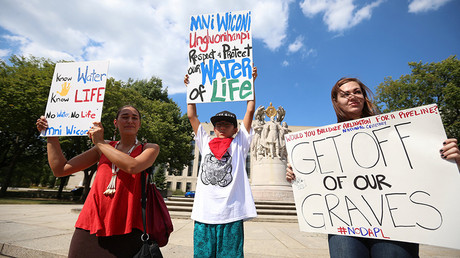‘You are not welcome!’ Native Americans ban S. Dakota governor for supporting Keystone XL pipeline
The Oglala Sioux Tribe has banned the governor of South Dakota Kristi Noem from entering Pine Ridge Indian Reservation, after she introduced Keystone XL pipeline-related bills without consulting natives living on ancestral lands.
“You are not welcome to visit our homelands, the Pine Ridge Reservation, until you rescind your support for SB 189 and SB 190, and affirm to your state and this country that First Amendment rights to free, political speech are among the truths you hold to be self-evident,” Tribe President Julian Bear Runner said in letter to Noem on Thursday, after the tribal council unanimously voted to bar the governor from their lands.
Also on rt.com Dakota pipeline company buys land thought to be site of destroyed cultural artifacts
The Oglala Sioux were especially “offended” that Noem failed to consult the nine Indian nations but talked to TransCanada, the company building the pipeline, before introducing two bills dealing with covering the potential financial burden associated with potentially violent protests over the construction of the Keystone XL Pipeline through western South Dakota.
While Senate Bill 189 establishes a fund from civil fines to help pay for costs associated with “riot boosting,”Senate Bill 190 allows state’s counties to sue any person who “directs, advises, encourages, or solicits other persons participating in the riot to acts of force or violence.” Both bills were met by stiff opposition from the Native American communities before Noem signed them into law in March.
Native American tribes have staged an epic battle against the erection of the massive, 1,100-mile oil highway to transport crude from Alberta, Canada to refineries in the United States, ever since its construction was proposed in 2008. Opponents of the multi-billion-dollar project say its presence will ruin the environment and threaten the very livelihood of the Natives’ existence.
“The Keystone XL Pipeline was even deemed by a previous president to be so dangerous to our sacred lands and atmosphere that he shut it down. How can you presume to criminalize those who would agree with that previous presidential judgment and hence take vigorous action to resist dangerous infrastructure?” Julian Bear Runner of the Oglala Sioux asked in the letter.
The Tribe urged the governor to repeal the “newly fabricated” laws based on an “unconstitutionally vague notion” before visiting Pine Ridge Reservation again, threatening that if the legislations are enforced, “we will have no choice but to banish you.”
The governor’s office expressed disappointment over the Tribe’s decision, but stressed that she will “continue working to engage with tribal members, stay in contact with tribal leadership, and maintain her efforts to build relationships with the tribes.”
Also on rt.com ‘You shall not pass!’ Native American groups vow to block Keystone XL pipeline
While the new laws are viewed by Noem as a “legislative solution to ensure the safety and efficiency of pipeline construction in South Dakota,” the American Civil Liberties Union (ACLU) argues that the measures violate the First Amendment and Fourteenth Amendment rights, by introducing liabilities and prosecution against those who chose to express themselves through protesting or rioting.
Last November, Native American and environmental groups convinced a Montana judge to temporarily halt the construction of the Keystone Pipeline, on grounds that the project failed to comply with federal environmental regulations. While the judge ordered a new environmental review, President Donald Trump issued a new presidential permit for the project in late March.
Like this story? Share it with a friend!







Comments are closed.